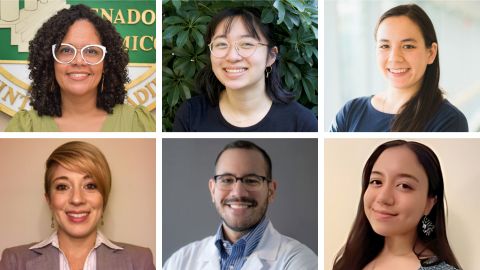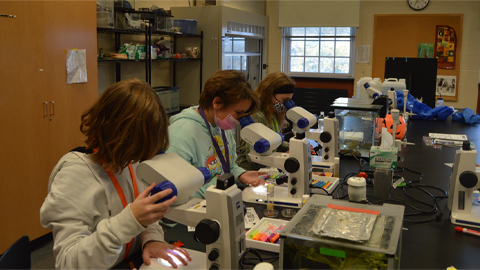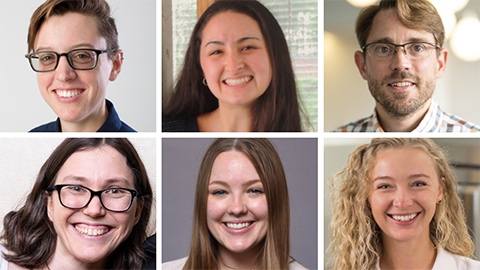Science Outreach and Communication Grant
One of the goals of the ASBMB is to increase public appreciation for and understanding of science by promoting science outreach events that encourage interactions between scientists and the community. The member wide outreach award facilitates the involvement of our members in public-engagement activities that foster the appreciation of science — particularly biochemistry and molecular biology — in informal settings.
During each grant cycle, we offer up to five grants of at most $1,000 each to encourage new or the enhancement of existing science outreach and communication activities. The grants should be used to increase public appreciation of biochemistry and molecular biology or related disciplines.
The society welcomes applications for a variety of outreach activities, including proposals for in-person, hybrid or fully virtual programming. These might include organizing a local science café or science fair, developing talks, workshops, or science demonstrations for a school or local community, organizing class visits to biochemistry laboratories to carry out experiments, starting a science podcast series, or creating engaging activities and resources for specific audiences such as these.
We look for creative ideas from applicants that take into consideration accessibility and reach.
Timeline and key dates
There is one round of applications per year.
- Early October: applications open
- Oct. 31: application submission deadline
- November–December: review process (proposals are evaluated by the ASBMB Science Outreach and Communication Committee)
- Early February: results are announced and grant letters of agreement are sent electronically
- Feb. 21: Signed letters of agreement are due
- February: Awardees receive notice of funds
Funds will be awarded through the institution/organization with which the applicant is affiliated and are to be used over a period of six months from the date of receipt of funds.
Application criteria
The ASBMB Science Outreach and Communication Grant program supports projects that:
- Increase public appreciation for and understanding of how science, with an emphasis on biochemistry and molecular biology, plays an important role in society.
- Provide opportunities for ASBMB members to participate in science outreach, engage with all communities, and develop stronger science communication skills.
Applications will be judged based on the following criteria:
Applications will be judged based on the following criteria:
- Applicant: The primary applicant must be an ASBMB member at the time of the application and during the period of the proposed activity.
- Preference will be given to early-career, undergraduate and graduate members of the society.
- The primary applicant may collaborate with other members and nonmembers of the society.
- Content: Although projects need not be limited to the science of biochemistry and molecular biology, the ASBMB strongly encourages activities that promote the understanding of the molecular nature of life.
- The proposal should clearly describe the activity and its goals.
- Proposals with creative and novel approaches to public engagement will be ranked highly, although not a requirement.
- The proposal must show how the activities are aligned with the needs or interests of the target audience.
- Target audience: The ASBMB is committed to belonging and opportunity and encourages activities benefiting all groups.
- The applicant must demonstrate a clear understanding and identify a legitimate need of the target audience.
- The proposal must clearly define the target audience and provide a brief explanation as to how the activities are relevant to the target audience.
- Examples of audiences may include: K–12, seniors, veterans, professionals in other fields, etc.
- Execution plan: the execution plan must be reasonably accomplished within the timeframe, budget, resources, and scope proposed.
- Organization & delivery: Please specify how the program will be organized and delivered. If there are volunteers involved, the applicant should indicate how they will be prepared/trained for the planned activities/program.
- Safety: Health and safety must be considered for all proposed activities and should follow guidelines set by the applicant’s locality, state, and institution. Personal Protective Equipment, or PPE, must be considered when implementing laboratory hands-on activities.
- Collaborators: Collaborators are encouraged, but not required. The applicant should indicate if there are internal or external collaborators and how they will support or enhance the program. If there are no collaborators, please indicate this and provide a reason.
- Timeline: The proposal must include a timeline for the activity, including its planning stages.
- Budget: The proposed project must be cost-effective, and the applicant must clearly describe how funds will be used. Please include cost per item.
- We encourage the use of funds for materials that are reusable, thereby contributing to a more sustainable project beyond the duration of the grant.
- We discourage the use of funds for food and/or transportation unless it is integral or beneficial to the program and it addresses a barrier to participation. Requests must be clearly justified in the application process. For further guidance on what constitutes a justification, please feel free to reach out to publicaffairs@asbmb.org.
*A note on transportation and/or food: If the application requests funding for food and/or transportation, it should collectively not exceed one third of the total proposed budget.
- Download an example budget sheet.
- Download a copy of the judges’ rubric.
Additional conditions
- Funding will be awarded through the institution/organization with which the applicant is affiliated.
- Safety must be considered for all proposed activities and should follow guidelines set by the applicant’s locality, state and institution and the U.S. Centers for Disease Control and Prevention.
- The applicant must submit a summary report after the completion of the activity. The report must include a description of the activity and the participants — both target audience and presenter(s). The ASBMB strongly encourages the use of surveys and/or reflection-based essays that capture the impact of the activity on both the target audience and the presenter(s). Members of the ASBMB Science Outreach and Communication Committee can work with the applicant to develop an appropriate assessment format.
FAQ
- As an ASBMB member based outside of the United States, am I eligible to apply?
Yes, as a member, you are eligible to apply for the grant even if you are based outside of the U.S. However, if you are selected, the funds would need to be allocated directly to your affiliated institution and a W8-BEN tax form would need to be submitted. - Are indirect costs allowed on the grant application budget?
No, the ASBMB does not support indirect costs in grant applications. Maintenance or administrative costs that are not directly related to the execution of the proposed activity are not supported in the budget. - Would my standing as PI or senior faculty negate the grant application?
Your career stage will not negate your eligibility to apply for the grant — we encourage all members of the ASBMB to apply. However, our aim is to empower early-career, postdocs, graduate and undergraduate students to apply and spearhead the efforts — having this element in an application would speak more to the strength of the proposal.
If you have any questions, please email us at publicaffairs@asbmb.org.
Outreach spotlights
Recipients of the grant talk to Adriana Norris of the ASBMB Science Outreach and Communication Committee about their projects.
Case studies
DNA Discovery Day and Museum DNA Discovery Center
Grant recipient: Emmett Smith
Emmett Smith engaged undergraduate students in Earlham College's “Human Genetics and Genomics” class and created a permanent hands-on DNA exhibit for their campus Joseph Moore Museum that opened on DNA Day (April 25). Download the case study to learn more
Decoding the mysteries of DNA
Grant recipient: Joshua Sokoloski
Josh Sokoloski planned three days of activities during STEM week for majority underserved middle-school students. Participants engaged in a variety of fun and educational activities around nucleic acids and their societal applications. Download the case study to learn more
Raising young minds for global impact through biochemistry and molecular biology
Grant recipient: Victor Nweze
Victor Nweze's project presented basic science through symposia and workshops to help build passion for biochemistry among students aged 11–19. Download the case study to learn more
Learn more
Meet the 2025 SOC grant awardees
Five science outreach and communication projects received up to $1,000 from ASBMB to promote the understanding of molecular life science.
Meet the 2024 SOC grant awardees
These five science outreach and communication projects each receive up to $1,000 from the ASBMB to help promote the understanding of life at a molecular level.
Small grants power outreach
A DNA summer camp, chemistry workshops for middle and high school students, and symposia for students in Nigeria are among the projects funded by ASBMB Science Outreach and Communication Grants.
Meet the 2023 SOC grant awardees
The ASBMB’s Science Outreach and Communication grants fund public engagement activities that foster the appreciation of science — particularly biochemistry and molecular biology — in informal...




